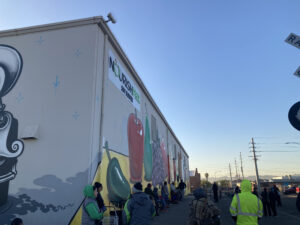- Slug: Mobile Clinics. 555 words.
- 1 photo available (thumbnail, caption below).
By Ignacio Ventura
Cronkite News
PHOENIX – In Arizona, 12.4% of residents live in poverty, and 12.1% of people under 65 lack health insurance, according to 2023 data from the U.S. Census Bureau. Mobile health clinics are helping to bridge the gap by providing essential care to underserved communities.
On the morning of Nov. 20, a green bus backed into a parking lot at the intersection of Ninth Avenue and Grant Street in Phoenix with hazard lights flashing. The bus, a mobile health clinic operated by Valleywise Health, was soon ready to serve. Staff set up a table with informational flyers, placed a sign welcoming walk-ins and opened the clinic doors to the public.
Inside, exam rooms offered a range of services, including sports physicals, women’s health care, children’s check-ups and HIV testing.
Other organizations like Valle Del Sol also provide mobile health clinics. Such clinics provide vital care to rural areas, vulnerable populations and those facing displacement, offering a flexible solution to meet diverse needs.
“Many people lack access to health care,” said Beth Fiorenza, executive director of Nourish Phoenix. “We want to ensure they have the access they need to be healthy and happy.”
Jason Vail Cruz, senior practice manager at Valleywise Health, highlighted the convenience of mobile clinics.
“Our mobile health clinic is really founded on the principle of eliminating obstacles for folks to access health care,” Cruz said. “By having it mobile, we are able to go to different parts of the community to really reach folks that may have transportation or other issues and to get them started on their health care journey.”
According to Cruz, the mobile clinics offer various family practice options.
“They can get labs, they can get other testing, they can have a physical done. If they’re not feeling well, the doctor can see them and provide care around it,” Cruz said.
The mobile clinics also play a critical role in addressing public health challenges, including HIV testing. According to HIV.gov, about 1.2 million people in the United States are living with HIV.
“HIV, right now, in its current form, if most people living with HIV are over the age of 50, but in terms of, folks that are newly infected with HIV, we see a lot of folks that are younger, aged between 22 to 34 and mainly in communities of color,” he said.
According to the HIV 2023 Surveillance Annual Report from the Arizona Department of Health Services, the Hispanic population had the largest number of HIV cases in the state, accounting for 405 of 975 new cases in 2022. That same report also revealed 162 cases in the Black population.
The National Institutes of Health recommend people at higher risk of HIV get tested each year.
While the services provided by the clinic are not free, representatives of the mobile clinics said they are affordable. Denisse Ozuna, a family nurse practitioner contracted with Valleywise Health, said “we go based on your insurance.”
Ozuna also highlighted the linguistic diversity of the community they serve.
“I think this is a great program for the community, especially – I know English and Spanish – and I know a lot of our patients are, maybe a big percentage of them speak only Spanish,” Ozuna said.
Those interested in finding a mobile health clinic can visit the Valleywise Health website to check the schedule and locations.
For more stories from Cronkite News, visit cronkitenews.azpbs.org.
